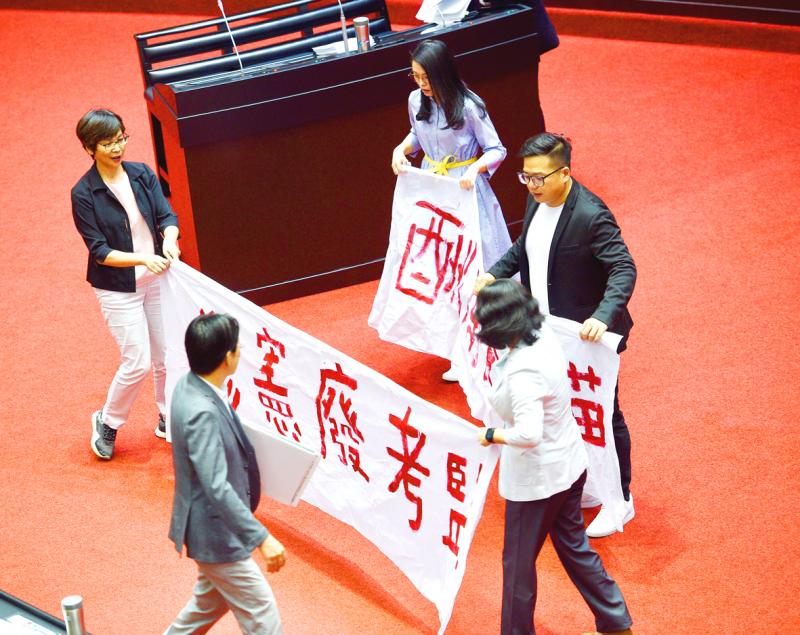The Control Yuan and Examination Yuan should be abolished as their seats are filled with “fat-cat patronage appointments” for well-paying and cushy jobs, while some members have accepted teaching positions in China, raising national security concerns, Taiwan People’s Party (TPP) and New Power Party (NPP) lawmakers said yesterday.
Prevailing public opinion is that it is time that both branches of government be abolished, the TPP’s five lawmakers said.
The life-long goal of many people in Taiwan’s academic circles is to be appointed to the Examination Yuan, “because it is such a cushy job without much to do, and by law members enjoy a very high salary commensurate with the head of a government ministry,” TPP Legislator Jang Chyi-lu (張其祿) said.

Photo: Peter Lo, Taipei Times
The current extraordinary legislative session is reviewing the nominations for 11 seats on the Examination Yuan, in charge of administering civil service examinations, and for 27 seats on the Control Yuan, the government’s watchdog body.
The TPP held a brief protest inside and outside the main legislative chamber, during which TPP caucus whip Lai Hsiang-ling (賴香伶) raised the issue of some Examination Yuan members accepting outside work, including lecturing posts in China.
“Many people are disgusted by the fact that Examination Yuan members earn outside income, even though their annual salary is NT$2.7 million [US$91,198], and if promoted to the board of examiners, members receive an extra NT$700,000 on top of their salaries,” Lai said.
“Some Examination Yuan members have accepted visiting professor or guest lecturer posts at universities in China. They are also known to receive other extra income from taking on other part-time academic work,” Lai said. “This is why most people see the seats as ‘fat-cat patronage appointments’ by which the ruling party can reward its friends.”
NPP Legislator Claire Wang (王婉諭) said that her party’s stance was very clear: both Control Yuan and the Examination Yuan should be abolished.
“However, before that can be done, we will scrutinize the nomination process very carefully, to see if the nominees are qualified,” she said.
NPP lawmakers said they were angry that none of the nominees had responded to the party’s questionnaire about specific cases involving the Examination Yuan’s authority.Those who had not responded included Examination Yuan president nominee Huang Jong-tsun (黃榮村) and vice president nominee Chou Hung-hsien (周弘憲).
Their refusals were outrageous, NPP caucus whip Chiu Hsien-chih (邱顯智) said.
“We had sent out the questionnaire a month ago, and it only had seven questions, the most important of which was the nominees’ opinion on discovering people taking a civil service exam had cheated,” Chiu said.
“The questionnaire is not so tough... Our society has many impoverished people, but Examination Yuan members enjoy very high salaries and good perks, all paid for by the taxpayers. By not responding to the questionnaire, they are showing their disregard of the taxpayers who are pay their salary,” Chiu said.

Taiwan has received more than US$70 million in royalties as of the end of last year from developing the F-16V jet as countries worldwide purchase or upgrade to this popular model, government and military officials said on Saturday. Taiwan funded the development of the F-16V jet and ended up the sole investor as other countries withdrew from the program. Now the F-16V is increasingly popular and countries must pay Taiwan a percentage in royalties when they purchase new F-16V aircraft or upgrade older F-16 models. The next five years are expected to be the peak for these royalties, with Taiwan potentially earning

STAY IN YOUR LANE: As the US and Israel attack Iran, the ministry has warned China not to overstep by including Taiwanese citizens in its evacuation orders The Ministry of Foreign Affairs (MOFA) yesterday rebuked a statement by China’s embassy in Israel that it would evacuate Taiwanese holders of Chinese travel documents from Israel amid the latter’s escalating conflict with Iran. Tensions have risen across the Middle East in the wake of US and Israeli airstrikes on Iran beginning Saturday. China subsequently issued an evacuation notice for its citizens. In a news release, the Chinese embassy in Israel said holders of “Taiwan compatriot permits (台胞證)” issued to Taiwanese nationals by Chinese authorities for travel to China — could register for evacuation to Egypt. In Taipei, the ministry yesterday said Taiwan

Taiwan is awaiting official notification from the US regarding the status of the Agreement on Reciprocal Trade (ART) after the US Supreme Court ruled US President Donald Trump's global tariffs unconstitutional. Speaking to reporters before a legislative hearing today, Premier Cho Jung-tai (卓榮泰) said that Taiwan's negotiation team remains focused on ensuring that the bilateral trade deal remains intact despite the legal challenge to Trump's tariff policy. "The US has pledged to notify its trade partners once the subsequent administrative and legal processes are finalized, and that certainly includes Taiwan," Cho said when asked about opposition parties’ doubts that the ART was

If China chose to invade Taiwan tomorrow, it would only have to sever three undersea fiber-optic cable clusters to cause a data blackout, Jason Hsu (許毓仁), a senior fellow at the Hudson Institute and former Chinese Nationalist Party (KMT) legislator, told a US security panel yesterday. In a Taiwan contingency, cable disruption would be one of the earliest preinvasion actions and the signal that escalation had begun, he said, adding that Taiwan’s current cable repair capabilities are insufficient. The US-China Economic and Security Review Commission (USCC) yesterday held a hearing on US-China Competition Under the Sea, with Hsu speaking on